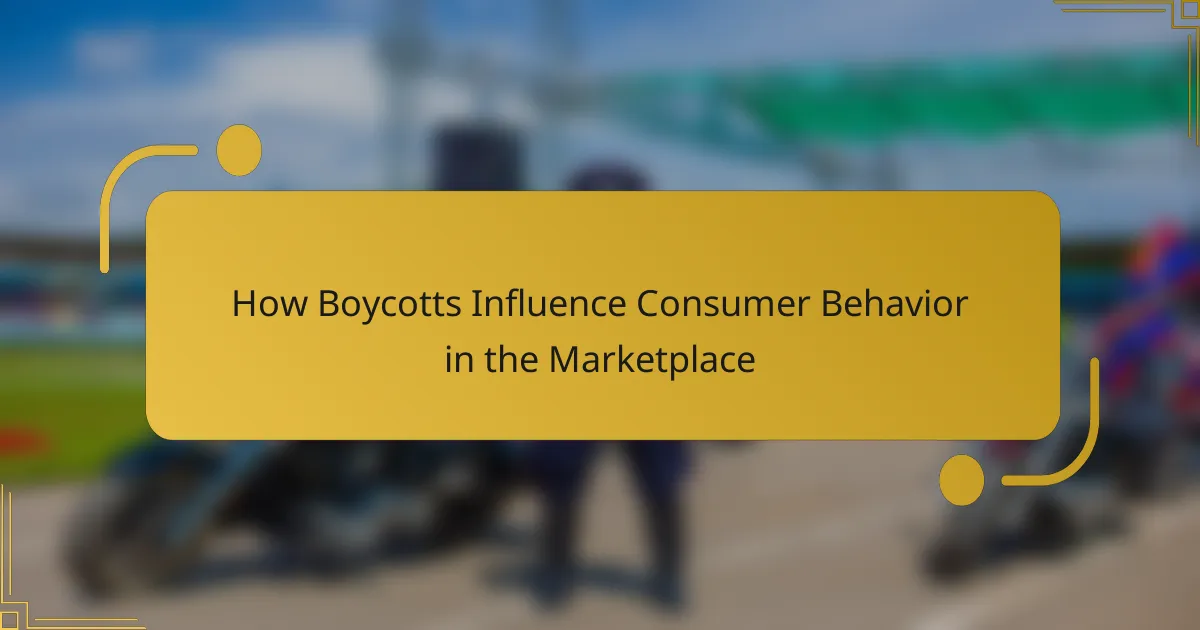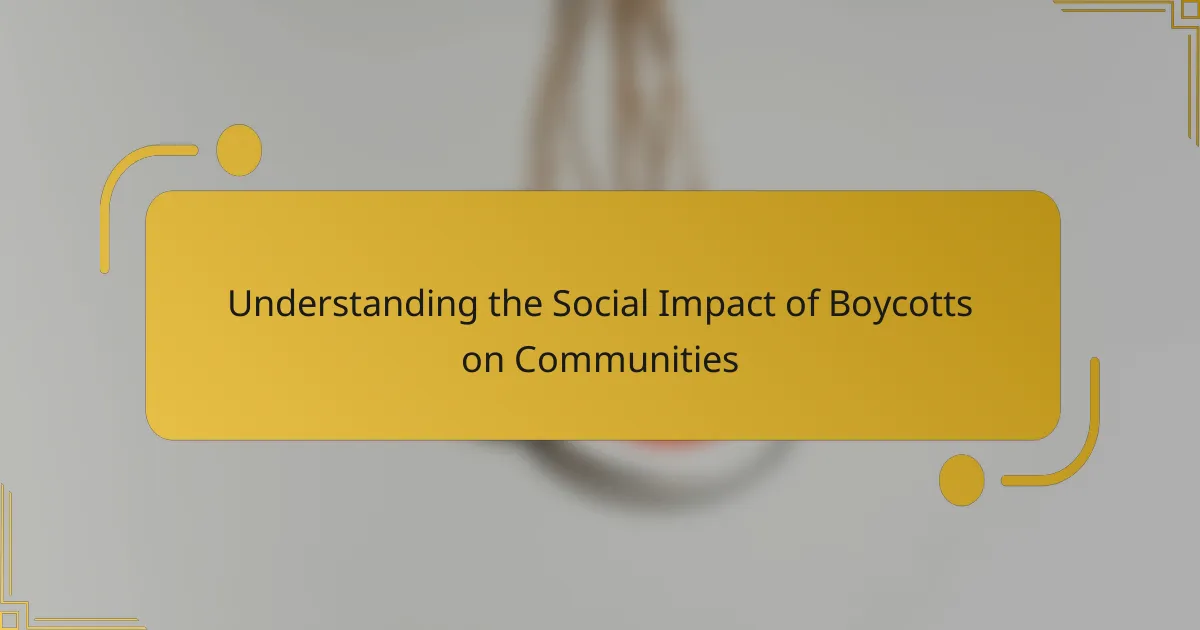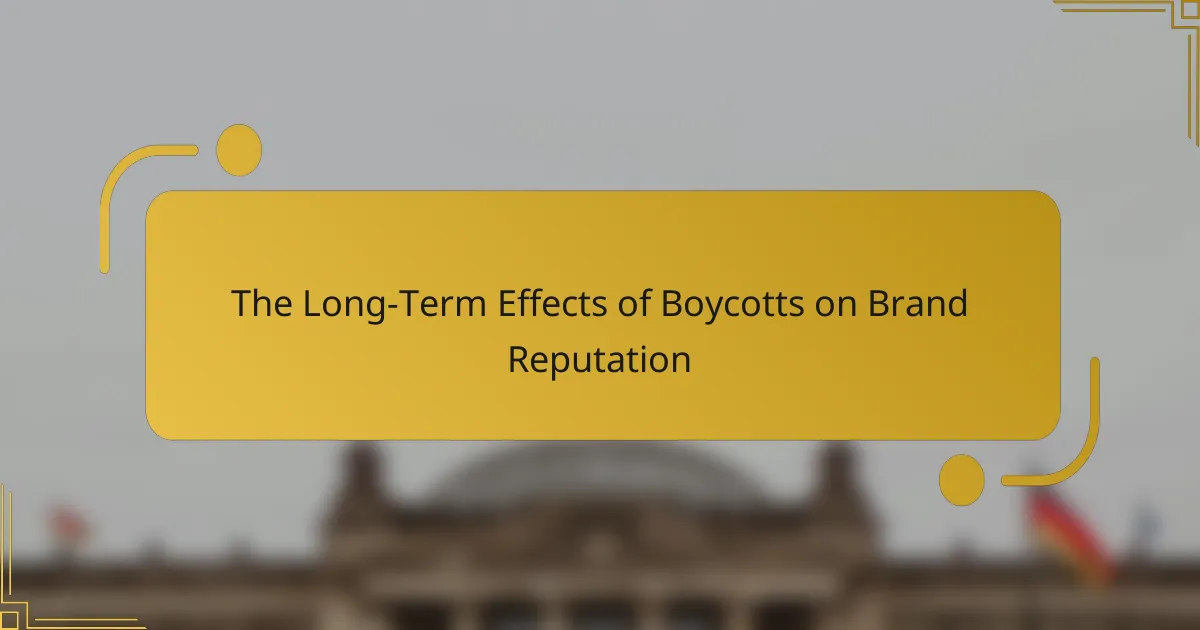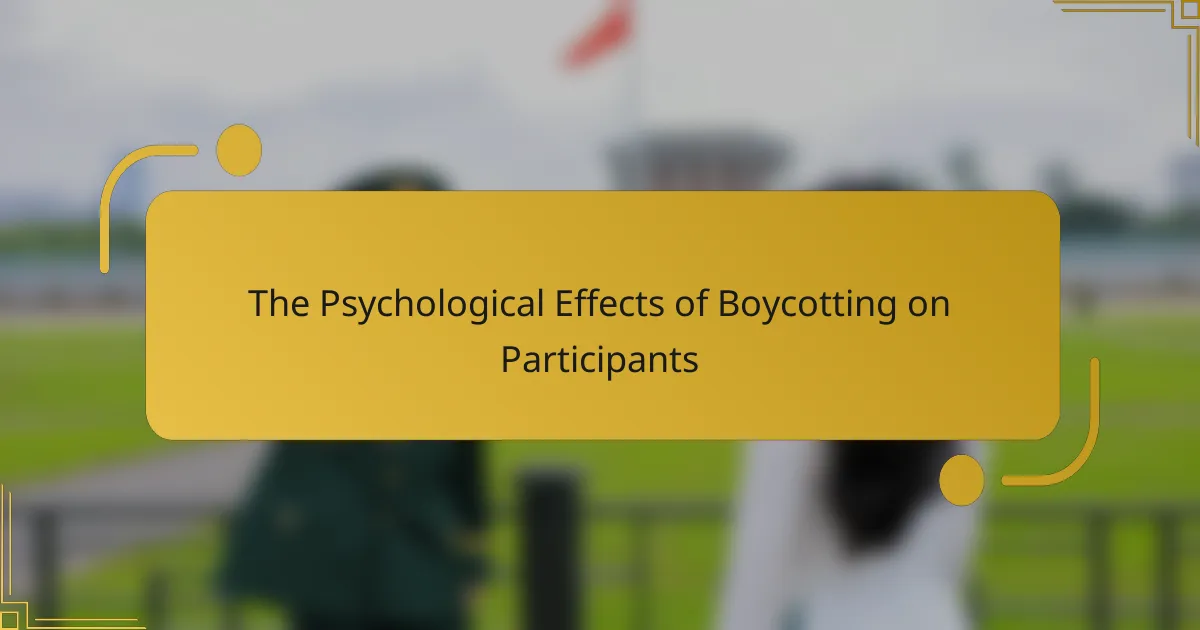Boycotts play a crucial role in shaping consumer behavior by encouraging individuals to withdraw support from brands that contradict their values. This shift not only drives consumers to seek alternatives that align with their ethical beliefs but also alters perceptions of brands, fostering greater awareness of social issues and emotional connections with companies. As a result, businesses must navigate these challenges by addressing consumer concerns and adapting their strategies to rebuild trust and loyalty.
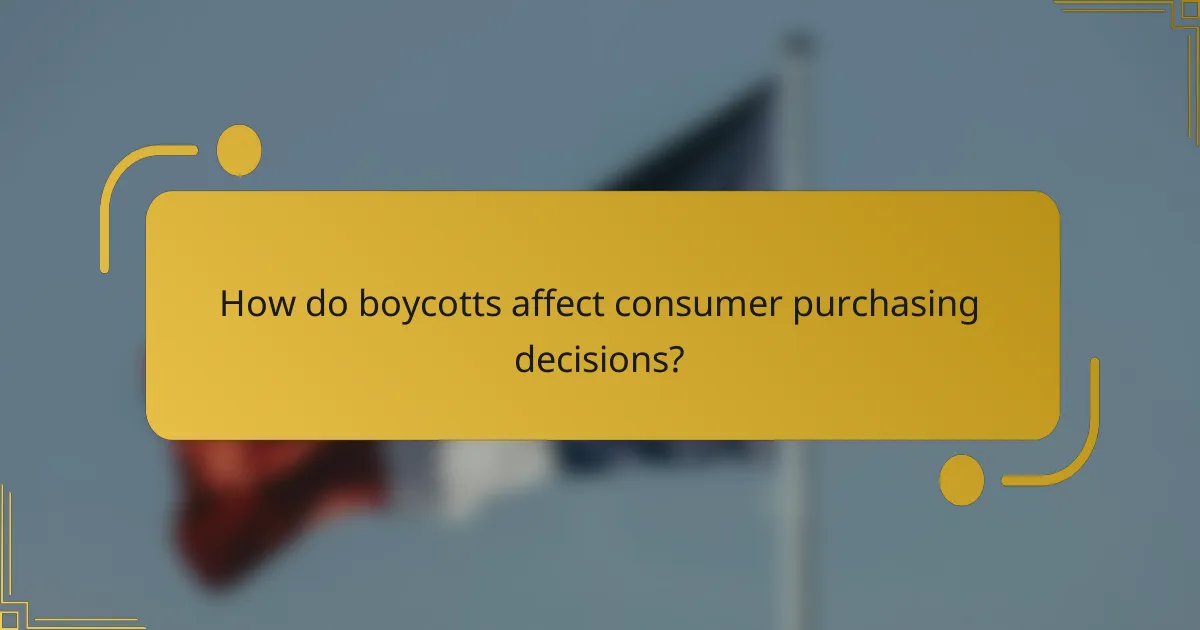
How do boycotts affect consumer purchasing decisions?
Boycotts significantly influence consumer purchasing decisions by prompting individuals to withdraw their support from brands that do not align with their values. This shift often leads consumers to seek alternatives that reflect their ethical beliefs and social concerns.
Increased brand loyalty for alternative products
When consumers participate in a boycott, they often turn to alternative products that align with their values, resulting in increased brand loyalty for these substitutes. For example, if a major corporation faces backlash for unethical practices, consumers may gravitate towards smaller, ethical brands that prioritize sustainability and social responsibility.
This loyalty can manifest in repeat purchases and word-of-mouth recommendations, further strengthening the market position of these alternative products. Brands that effectively communicate their values and commitment to ethical practices can cultivate a dedicated customer base.
Shift in market share towards ethical brands
Boycotts can lead to a noticeable shift in market share towards ethical brands, as consumers actively seek out companies that align with their beliefs. This trend is particularly evident in sectors like food, fashion, and technology, where ethical considerations play a significant role in purchasing decisions.
For instance, if a well-known brand faces a boycott due to environmental concerns, consumers may choose to support eco-friendly brands instead. This shift can result in a substantial increase in sales for ethical brands, sometimes capturing a significant portion of the market previously held by the boycotted company.
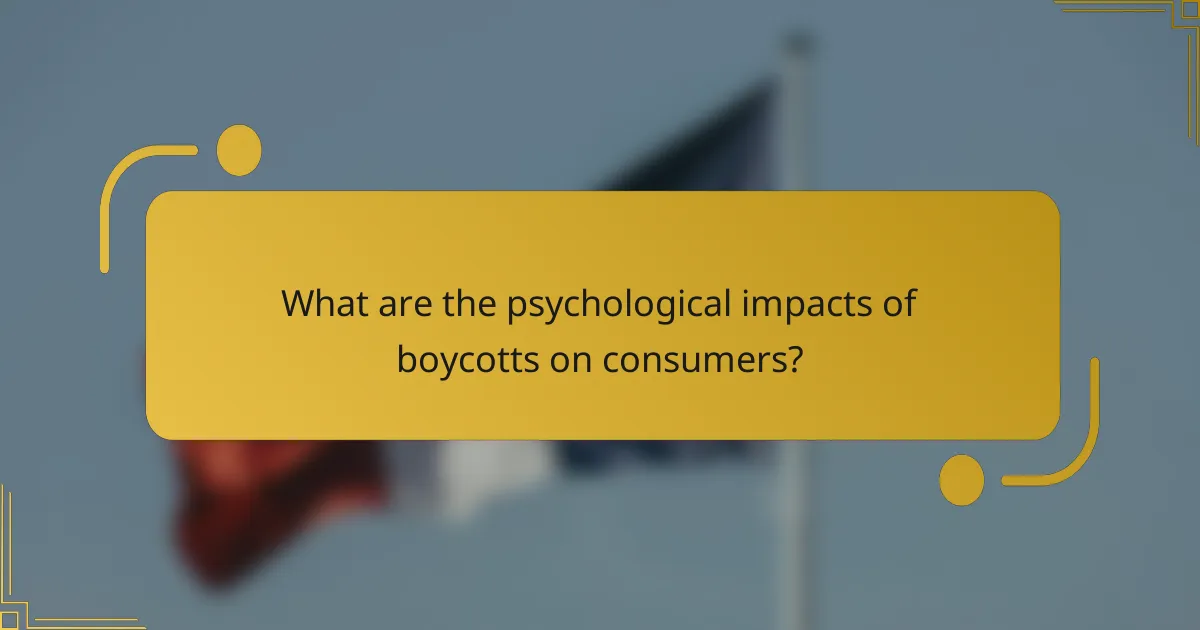
What are the psychological impacts of boycotts on consumers?
Boycotts can significantly affect consumer psychology by altering perceptions of brands and their values. They often lead to increased awareness of social issues and foster emotional connections with or against particular companies.
Heightened awareness of social issues
Boycotts serve as a catalyst for consumers to become more informed about various social issues, such as environmental concerns or labor practices. When a brand is boycotted, it often brings attention to the underlying issues that prompted the action, encouraging consumers to educate themselves and engage in discussions.
This heightened awareness can lead to a shift in purchasing habits, as consumers may choose to support brands that align with their values. For instance, a boycott against a company for unethical labor practices may prompt consumers to seek alternatives that prioritize fair trade and ethical sourcing.
Emotional engagement with brands
Boycotts can create strong emotional responses, either in support of or against a brand. Consumers who participate in a boycott often feel a sense of solidarity with like-minded individuals, reinforcing their commitment to the cause and influencing their purchasing decisions.
Conversely, brands that are perceived as standing up for social justice may foster loyalty among consumers who value those principles. For example, a company that actively supports environmental sustainability may attract customers who feel passionately about climate change, leading to increased brand loyalty and advocacy.
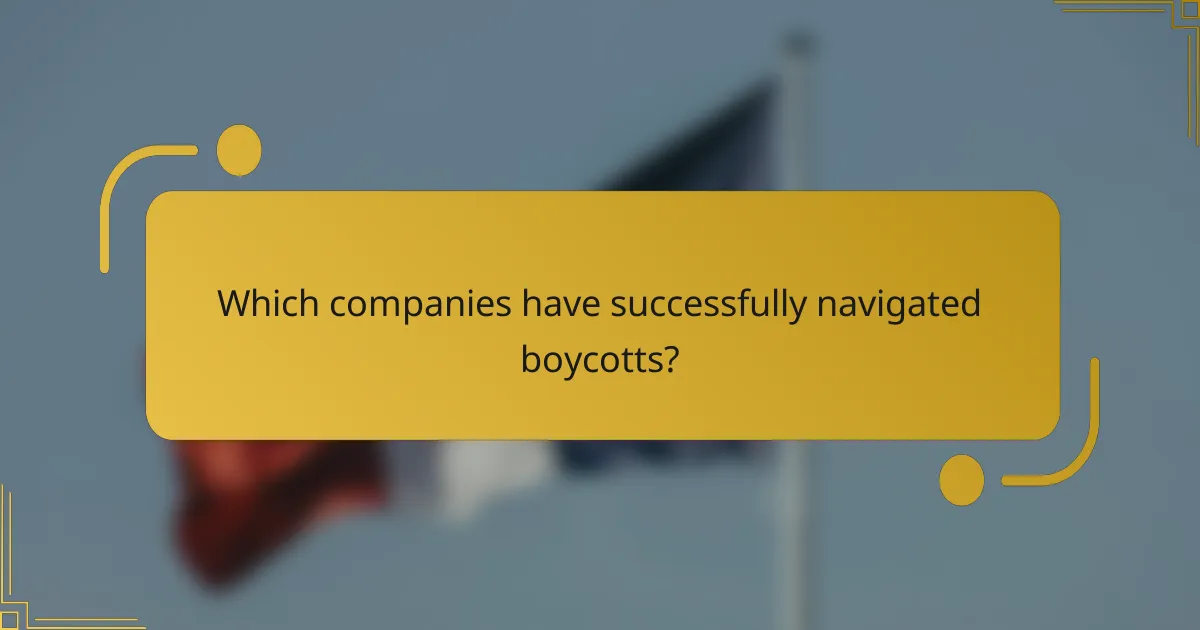
Which companies have successfully navigated boycotts?
Several companies have effectively managed to navigate boycotts by addressing consumer concerns and adapting their strategies. Successful navigation often involves transparent communication, commitment to social issues, and proactive measures to rebuild trust with customers.
Nike’s response to Colin Kaepernick controversy
Nike faced significant backlash after featuring Colin Kaepernick in its advertising campaign, which highlighted social justice issues. Instead of retreating, Nike embraced the controversy, reinforcing its brand identity and values aligned with activism.
The company reported a boost in sales following the campaign, demonstrating that a well-executed response to a boycott can enhance brand loyalty among target demographics. Nike’s approach serves as a case study in leveraging social issues for brand strength.
Starbucks’ handling of racial bias allegations
Starbucks encountered a boycott after an incident involving racial bias at one of its locations. In response, the company took immediate action by closing stores for a day to conduct racial bias training for employees, signaling its commitment to addressing the issue.
This proactive measure not only mitigated the boycott’s impact but also reinforced Starbucks’ dedication to inclusivity. The incident illustrates how addressing consumer concerns directly can lead to a more positive brand perception in the long run.
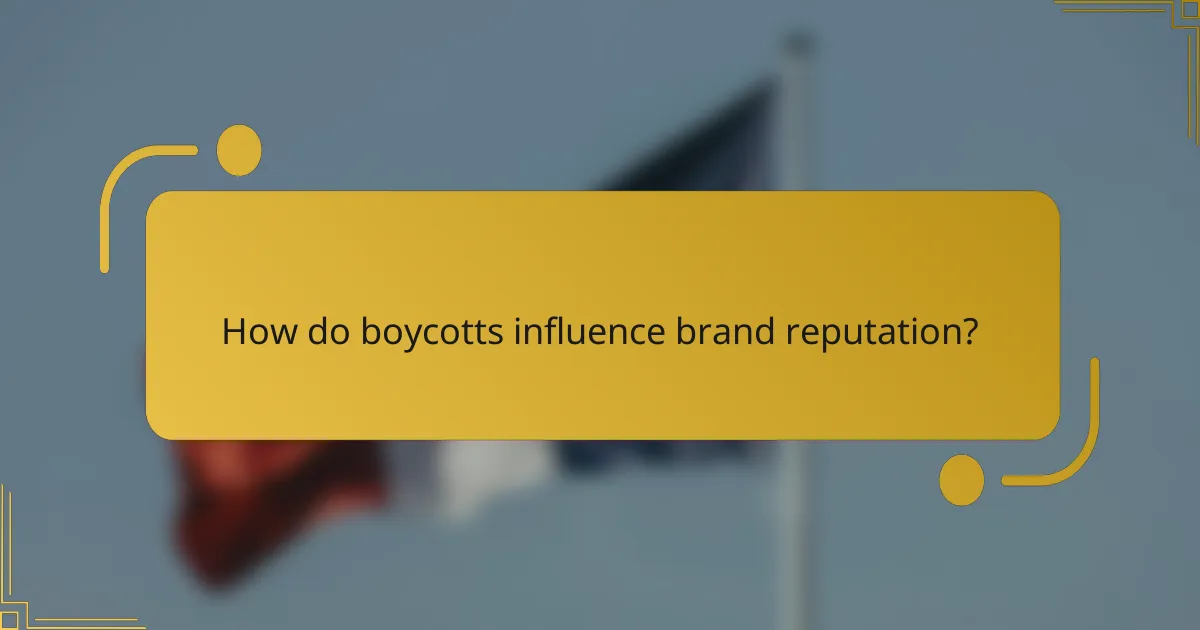
How do boycotts influence brand reputation?
Boycotts can significantly impact brand reputation by altering consumer perceptions and trust. When a brand is targeted by a boycott, it often faces immediate backlash, which can lead to long-lasting effects on its public image.
Long-term damage to brand image
Boycotts can inflict enduring harm on a brand’s image, especially if the reasons behind the boycott resonate with consumers. For example, brands associated with unethical practices or controversial statements may find it difficult to regain consumer trust even after the boycott ends.
Research indicates that brands facing boycotts can experience a decline in sales, sometimes by double-digit percentages, during and after the boycott period. This decline can persist for months or even years, depending on the severity of the issue and the brand’s response.
Potential for positive rebranding opportunities
While boycotts can damage a brand’s reputation, they also present opportunities for positive rebranding. Brands that respond effectively to consumer concerns can turn a negative situation into a chance for growth and improvement.
For instance, companies that engage in transparent dialogue with consumers and implement changes based on feedback may enhance their reputation. This proactive approach can lead to increased customer loyalty and a stronger brand identity, as seen with several brands that have successfully navigated backlash by committing to social responsibility initiatives.
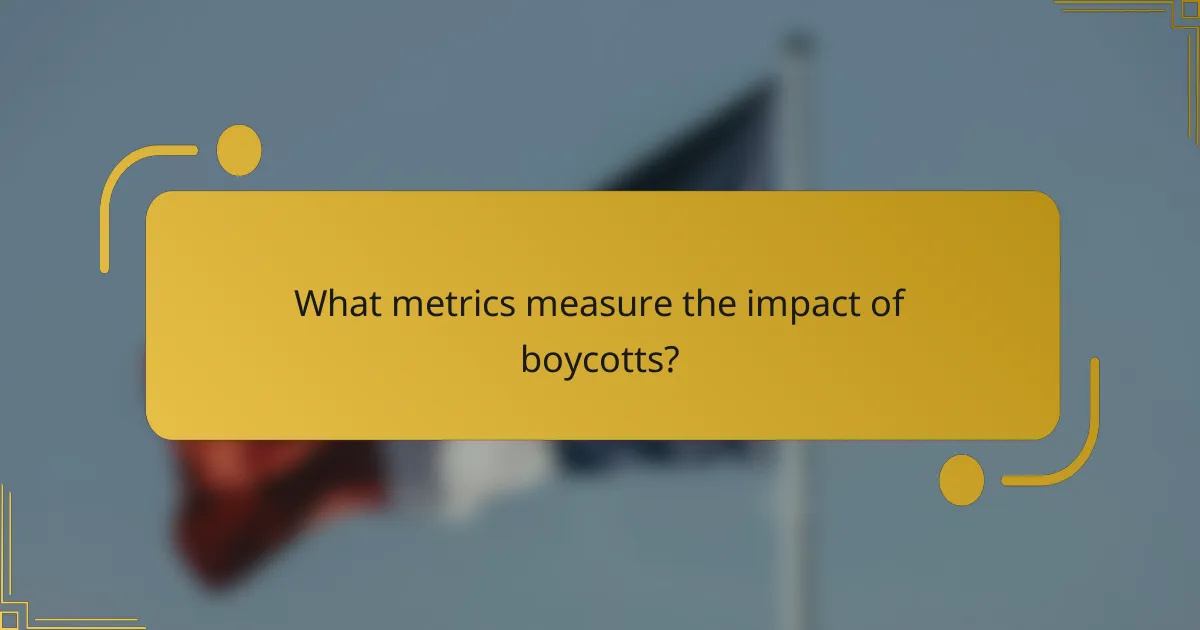
What metrics measure the impact of boycotts?
Metrics that measure the impact of boycotts include sales data, social media sentiment, and customer engagement statistics. These indicators help businesses understand how consumer behavior shifts in response to collective actions against a brand or product.
Sales data analysis pre- and post-boycott
Analyzing sales data before and after a boycott provides clear insights into its financial impact. Companies often experience a noticeable decline in revenue during a boycott, which can vary from low single-digit percentages to significant drops depending on the boycott’s scale and duration.
To effectively assess this metric, businesses should compare sales figures over comparable time frames, such as the same quarter in previous years. This helps isolate the boycott’s effects from seasonal trends or other external factors.
Social media sentiment analysis
Social media sentiment analysis involves tracking public opinion about a brand across various platforms. This metric gauges consumer feelings, which can shift dramatically during a boycott, often moving from neutral or positive to negative.
Tools that analyze sentiment can categorize mentions as positive, negative, or neutral, providing a clearer picture of consumer attitudes. A significant increase in negative sentiment, often measured in percentages, can indicate the boycott’s effectiveness and influence on brand perception.
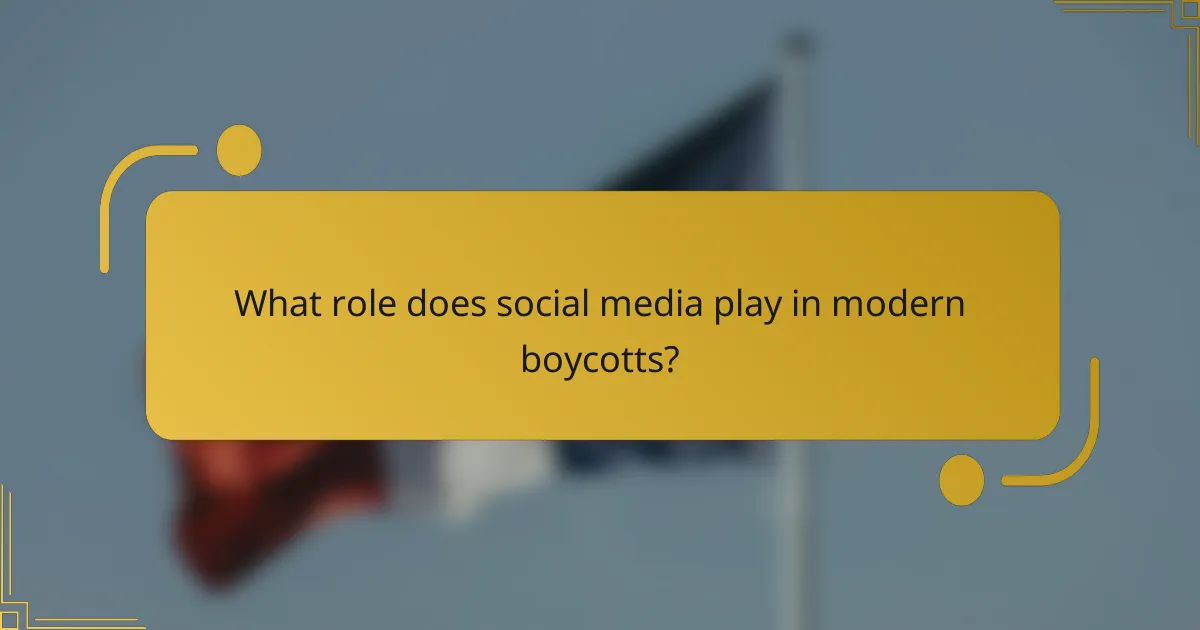
What role does social media play in modern boycotts?
Social media serves as a powerful platform for organizing and amplifying boycotts, allowing consumers to share their grievances and mobilize support quickly. It enables individuals to connect over shared values and concerns, leading to widespread awareness and participation in boycott efforts.
Amplification of consumer voices
Social media amplifies consumer voices by providing a space for individuals to express their opinions and experiences with brands. Platforms like Twitter, Facebook, and Instagram allow users to share posts that can reach thousands or even millions, increasing the visibility of boycott calls. This amplification can significantly influence public perception and brand reputation.
For example, a single viral post about unethical practices can lead to a rapid decline in a company’s sales, as consumers rally around the cause. Brands must be attentive to social media sentiment to avoid backlash and address consumer concerns proactively.
Rapid mobilization of boycott campaigns
Social media facilitates the rapid mobilization of boycott campaigns, enabling groups to organize swiftly and efficiently. Hashtags and viral challenges can spread awareness in a matter of hours, encouraging consumers to participate in collective action against brands. This immediacy can catch companies off guard, forcing them to respond quickly to consumer demands.
For instance, a trending hashtag can lead to a coordinated effort to boycott a product or service, often resulting in significant financial impact within days. Companies should monitor social media trends and engage with consumers to mitigate potential boycott threats and foster positive relationships.
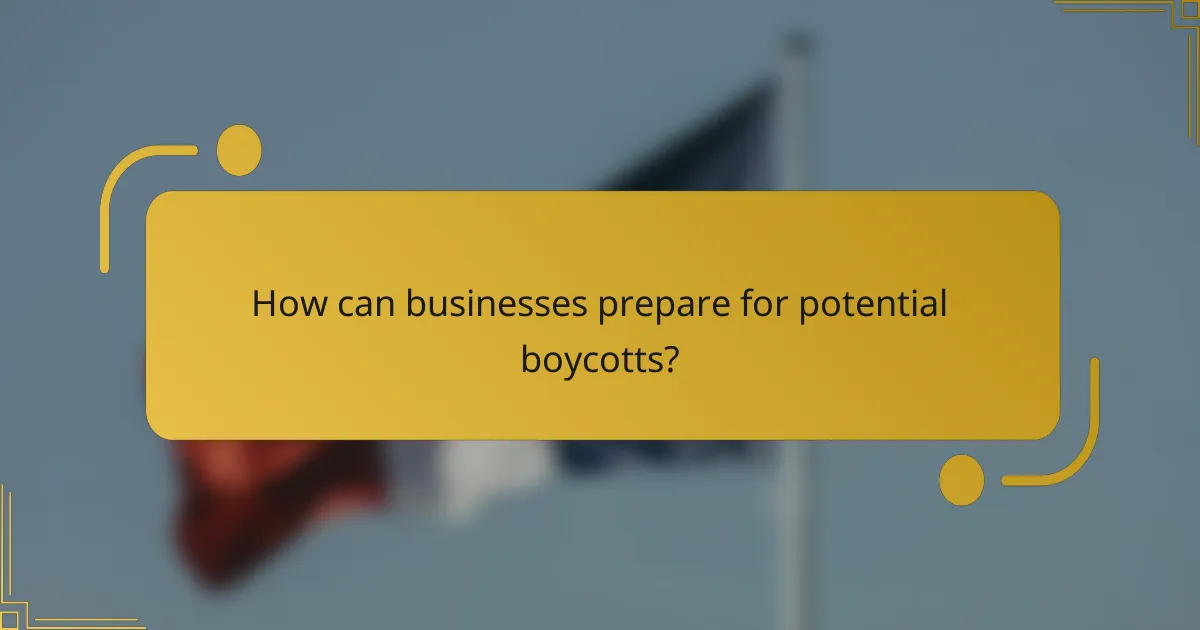
How can businesses prepare for potential boycotts?
Businesses can prepare for potential boycotts by developing proactive strategies that address consumer concerns and establish a crisis management plan. This preparation involves understanding the triggers for boycotts and creating communication channels to engage with customers effectively.
Developing crisis management strategies
Establishing a crisis management strategy is vital for businesses to respond swiftly and effectively to potential boycotts. This includes identifying key stakeholders, outlining communication protocols, and designating a crisis management team. Regularly reviewing and updating these strategies can help ensure that the business is ready to act when necessary.
Consider conducting scenario planning exercises to simulate various boycott situations. This practice can help teams understand the potential impact on operations and reputation, allowing for more informed decision-making during an actual crisis.
Engaging with consumers proactively
Proactive engagement with consumers can mitigate the risk of boycotts by fostering trust and transparency. Businesses should actively listen to customer feedback and address concerns through various channels, such as social media, surveys, and community forums. This engagement helps build a positive brand image and demonstrates that the business values its customers’ opinions.
Implementing regular communication strategies, such as newsletters or updates on corporate social responsibility initiatives, can keep consumers informed and connected. By showcasing commitment to ethical practices and community involvement, businesses can strengthen their relationship with consumers and reduce the likelihood of boycotts.
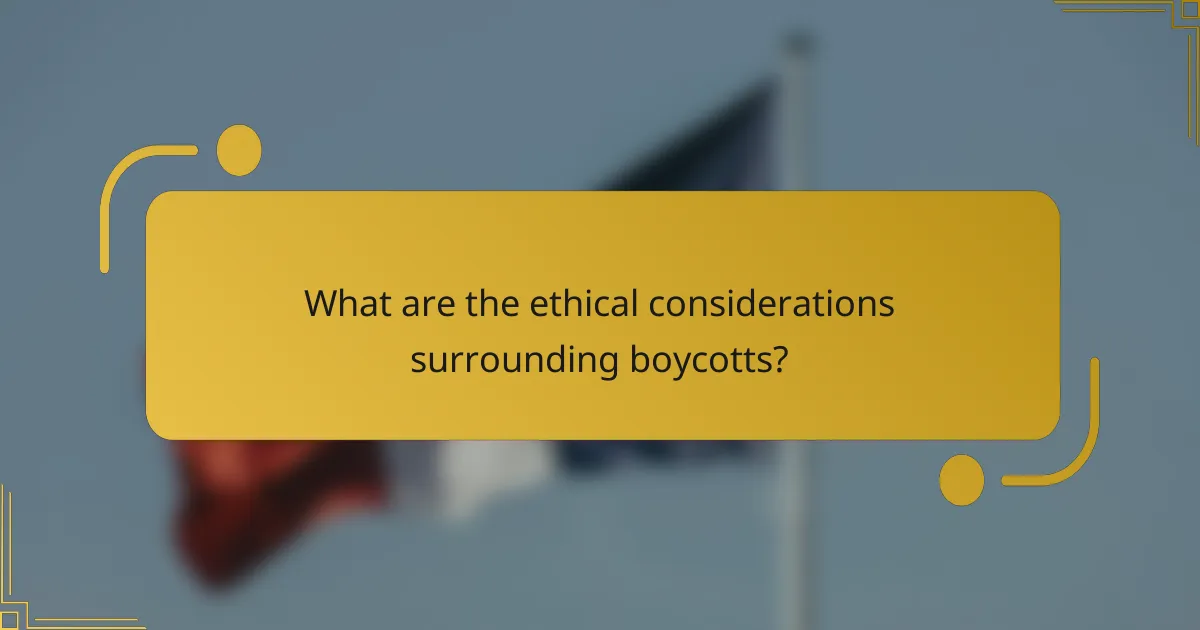
What are the ethical considerations surrounding boycotts?
Ethical considerations in boycotts often revolve around the impact on various stakeholders, including consumers, employees, and the broader community. Boycotts can serve as a powerful tool for social change, but they may also lead to unintended consequences that affect innocent parties.
Impact on employees and supply chains
Boycotts can significantly affect employees, particularly those who may not share the views prompting the boycott. When consumers choose to boycott a company, it can lead to reduced sales, which may result in layoffs or reduced hours for workers.
Additionally, supply chains can be disrupted as companies respond to consumer pressure. Suppliers may face financial strain if their primary customers are boycotted, leading to a ripple effect that can impact small businesses and local economies.
Balancing activism with business interests
Companies must navigate the delicate balance between supporting social causes and maintaining profitability. While taking a stand on ethical issues can enhance brand loyalty among certain consumer segments, it may alienate others who disagree.
To effectively balance activism with business interests, companies should consider their target audience and the potential backlash. Engaging in transparent communication and aligning actions with core values can help mitigate risks while still supporting meaningful causes.
